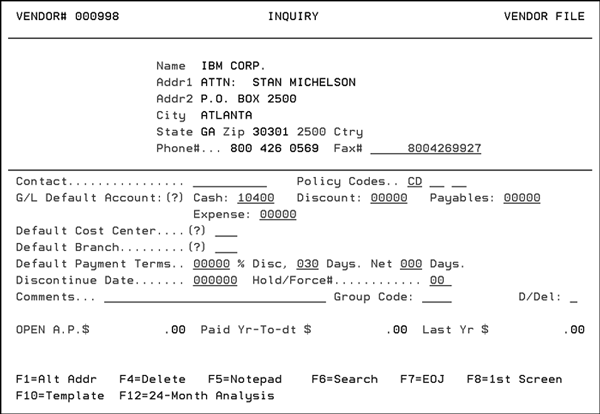Vendor File - FIL 14
The Vendor File contains information about your vendors. It primarily consists of information that is used by the Accounts Payable system. The file supports GL account branch and cost center information as well as terms and discontinue date information.
Vendors are distinguished from suppliers, and are kept in a separate file. Suppliers sell material that is considered inventory. Vendors sell products and services that are considered expenses or non-inventory assets.

|
Field Name |
Description/Instructions |
|
Policy Codes |
Used to trigger special processing or identifying certain vendors or situations. These can be user-assigned, or assigned by Kerridge.
|
|
Default Expense Acct# |
Expense account number for the vendor. See Chart of Accounts for full listing. Each time an invoice for this vendor is entered in the Accounts Payable system, the default expense account number appears automatically. If multiple expense accounts are used for a vendor, enter the most frequently used expense account or leave this field blank. |
|
Default Cost Center |
If you use the cost center for accounting purposes, and this vendor's invoices are always charged to the same cost center, enter that cost center code here. If a cost center is entered here, it automatically appears on the Accounts Payable input screen whenever invoices are entered for this vendor. |
|
Default Branch |
The Default Branch field is automatically inserted into the Branch field of the Enter Payables Program when entering vouchers. |
|
Default Payment Terms |
Enter the terms of payment that are allowed for the vendor. You can enter a percentage discount and the number of days due. For example, enter 00200%, 015 days to indicate 2% for 15 days. |
|
Disc, Days. Net Days |
This field, displayed only if the System Wide Setting - Options for Accounts Payable is activated, gives you flexibility over two tier terms. Two tier terms have 2 due dates - one to get the discount, and a final net due date. For example, if a supplier's terms are 2% 15 Days, Net 30, then the AP system initially sets the due date at 15 days from the invoice date. With two tier terms activated, if the invoice is not paid by the due date, then the due date is changed to 30 days from the invoice date. If you enter terms, then in Accounts Payable when you enter the invoice from this Vendor, the terms are pulled from the respective files. You can override the terms in Accounts Payable. The following are some examples of how these settings work:
Only enter the Net Days field if there is a discount, and the net days is greater than the discount days. |
|
Discontinue Date |
Enter the date on which you have or will stop doing business with the vendor, if applicable. |
|
Hold/Force# |
This field is used by the Accounts Payable application for controlling automatic payments. |
|
Comments |
Additional information about comments on the vendor (up to 30 characters). Press F5 to go to the notepad if additional space is required. |
|
Group |
This field allows you to assign a vendor to a group. A Vendor group provides another level of organization of payments. For example, you can group vendors by the type of product or service they provide, and generate checks by group. You can set up groups for installers, import suppliers, domestic suppliers, etc. Supplier/Vendor
groups are established via ACT 120.
|
|
D/Del |
Enter D in this field to delete this record, if the security and other restrictions on your system allow. |
|
The following fields are not accessible for update. The information in these fields is obtained from the Accounting System. |
|
|
Open A/P$ |
Accounts payable amount currently open for this vendor. |
|
Paid Yr-To-Dt |
Amount paid to this vendor in the current fiscal year. Paid Yr-to-Dt total is an accumulation of checks recorded through AP 1 or AP 8, and checks issued through AP 105. |
|
Paid Last Year |
Amount paid to this vendor in the last fiscal year. |
Function Keys
|
Function Keys |
Description |
|
F1 |
Go to the Alternate Address screen. The alternate address can be printed on accounts payable checks or simply stored here for reference. The main vendor address is the address to which purchase orders should be mailed. Enter Y on this screen to use the alternate address as the remittance address on payments to the vendor. |
|
F5 |
Go to the Vendor Notepad screen. |
|
F6 |
Search for vendor numbers. |
|
F7 |
End the job and return to the File Maintenance Menu. |
|
F8 |
Return to the Vendor File Entry screen. |
